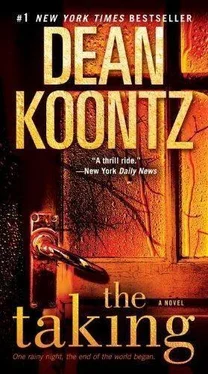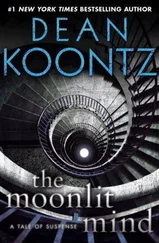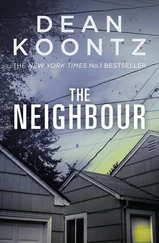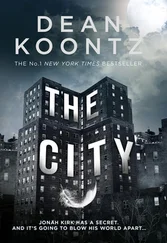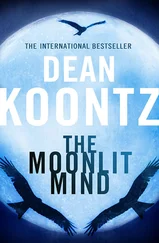As Neil backed out of the sacristy into the yard, a storm seemed to break inside the church. A hard clap of thunder shuddered the building, as violent as any lightning-chasing crash that ever shook the heavens.
Crumblings of loose mortar rattled out of the stone walls. Dust and paper debris plumed from the open sacristy door.
Surely the floor had collapsed into the basement. The roiling fire damped suddenly, briefly, then flared higher and brighter than before, flamboyantly illuminating the sacred geometries of the colorful windows. Even this roar brought no citizens into the street. They were huddled in their homes with baseball bats and handguns, or gone to other redoubts-or dead. Or worse than dead: living farms for alien fungus, living egg cases for the entomological wonders of another world.
THE DRAMA OF THE BURNING CHURCH PLAYED bright upon the gloom, but Molly was surfeited with spectacle. Trusting that the collapsed floor and the storm of fire would eradicate the pestilence in the basement and reduce the hagridden cadavers to ashes and knobs of charred bones, she turned away and urged the children across the yard, toward the street.
Looking shaken but grimly determined, Neil joined them. "Where now?"
"If Virgil has more places to lead us," she said, "we'll follow him, but not until we've gone back to the tavern."
"Why there?"
Molly remembered Cassie, the nine-year-old girl with sapphire eyes, daughter of fence-sitters, left behind.
She recalled, as well, how the nine dogs had roamed the tavern end to end, assiduously sniffing the well-worn floor. She had assumed they were savoring the fragrant stains of dropped food and spilled drinks.
Her assumptions had changed.
"If the tavern has a basement, there's something in it, sure as hell. We've got to get those people out of there before it's too late."
They were just twenty feet from the street when a refugee out of an LSD-inspired hallucination moved in the purple half-light, approaching from their right across the rectory lawn. They halted but didn't at once retreat.
A colony of white fungi, smaller than but otherwise identical to the one they had seen in the narthex of St. Perpetua's, was on the move: round bladderlike structures in various sizes, glistering with a milky ooze, and soft veiny sacs that continuously swelled and partially deflated and swelled again, as though the creature had been turned inside out, revealing clusters of internal organs. It progressed on eight short legs that reminded Molly of those on a Jerusalem cricket-insectile but thick and tough.
The children crowded close to Molly. She discovered that their trust gave her courage in return for whatever strength her presence imparted to them.
Neil fished shells out of his coat pockets, pumped one into the chamber of the shotgun, and loaded three more in the tubular magazine.
Asymmetrical, about twice the size of Virgil, low to the ground, the thing proceeded at a measured pace. Although it didn't seem to be built for speed and had no apparent visual apparatus to guide it, Molly didn't discount the possibility that it could move much faster when necessary, guided by some sense other than-but as reliable as-eyesight.
Well fed and content, crocodiles also appeared to be slow and ungainly. When hungry or irritated, however, they could outrun most dogs or any human.
If this too-solid apparition was a mere fungus or another more sophisticated phylum of plant, it wasn't likely to be a dangerous predator in the tradition of the potted carnivore in Little Shop of Horrors. On the other hand, innocuous plant life didn't sprout legs and travel.
Behind them, church windows burst from the heat. Showers of bright glass rained down and puddled into darker mosaics on the wet lawn.
Like cloud-fluttered moonglow in a dream rich with psychosis, orange firelight rippled across the rain-soaked lawn, over the loathsome bulbous fungus that now seemed obscene in its slimy tumescence.
She remembered her certainty, at first sight of the larger specimen in the narthex, that it was malignant, if not malevolent. And aware.
Drunk or not, Derek Sawtelle had gotten to the heart of the matter when he had said that on the world from which these invaders came, perhaps the differences between plant and animal life were not as clearly defined as on Earth. Consequently, predators might not be easily recognized in all instances.
The creature didn't deviate from its original line of direction, didn't start toward them, but marched steadily southward. It crossed their path and kept going.
As it began to move away, a sound so unexpected and disturbing issued from it that Molly felt her reason wobble like a spinning coin losing momentum. This thing, this pale atrocity, let out a sound that was too much like a grief-stricken woman weeping quietly, quietly but in the most poignant misery.
For an instant she tried to deny the source of the lamentations, and scanned the nearby night for a human figure to match the voice. She could see no one.
The eight-legged abomination was indeed the mourner, although the quality of its cry was most likely natural to it and not mimicry, a similarity explained sheerly by chance.
To hear it as grief or misery was no doubt to misunderstand it. The cry of a loon pealing across the stillness of a lake on a summer night will sound lonely to the human ear even if loneliness is not the state of mind that the loon intends to express.
Nevertheless, to hear such pitiable human sounds issuing from a creature so alien and repulsive in every regard was profoundly disquieting, chilling.
The thing fell silent-but a moment later, from between or behind the houses across the street, came a faint answering pule.
Another of its kind was out there in the purple morning, and the monstrous crier halted, as if listening to this response.
A second reply rose from a different direction, also faint-but this one was of a deeper timbre and sounded less like a weeping woman than like a weeping man.
When those other voices fell silent, the abomination moved once more, continuing on its original course.
Surreal. Unreal. Too real.
"Look," Neil said, pointing north.
Another luminosity, like the one that had hovered over them on La Cresta Avenue, appeared in the dense fog layer, traveling soundlessly across the town from the northeast to the southwest.
"And there."
A second glowing craft brightened out of the west and proceeded eastward on a serpentine course.
Behind the secreting overcast, the masters of the morning sky were attending to the business of conquest.
"But at my back in a cold blast I hear
The rattle of the bones, and chuckle spread from ear to ear.'
– T. S. Eliot, The Waste Land
EN ROUTE FROM ST. PERPETUA'S TO THE TAIL OF THE Wolf Tavern, Johnny and Abby stayed close to Neil, while Virgil trotted behind them, alert to the possibility of attack from the rear or from either flank. The dog seemed to understand that for the moment his primary duty was to guard rather than to lead.
At the front of their small column, traveling with the twins and their sister, Molly learned that the boys were Eric and Elric Crudup, born on New Year's Day ten years ago this coming January. They had been named after Viking heroes, although neither of their parents could claim a single Scandinavian ancestor.
"Our mom and dad like aquavit and Elephant beer," said Eric. "They chase one with the other."
"Aquavit and Elephant beer are made in Scandinavia," Elric explained.
Their sister-more Scandinavian-looking with her lighter locks than her brothers were with their dark hair-went by her middle name, Bethany, because her first name was Grendel.
Читать дальше
Конец ознакомительного отрывка
Купить книгу
